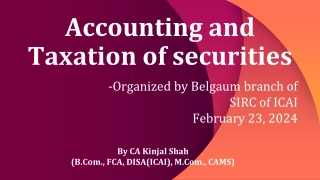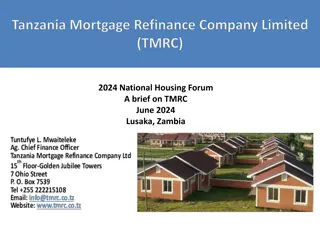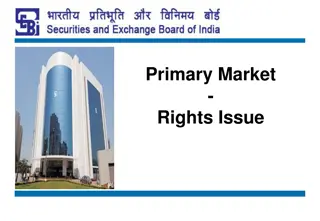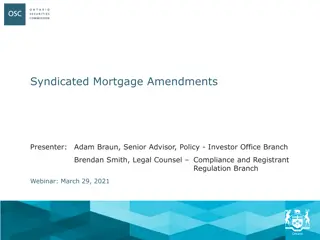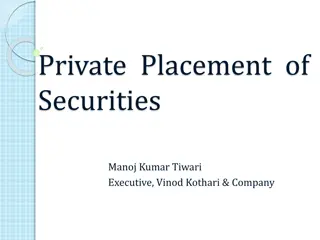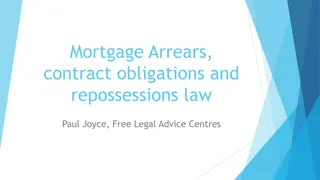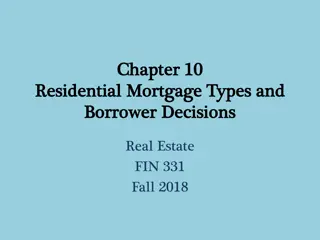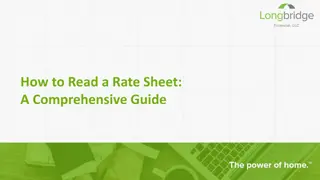Understanding Marshalling of Securities in Mortgage Law
Marshalling of Securities, as per Section 81 of the Transfer of Property Act, addresses the scenario where a property owner mortgages properties to different individuals. This doctrine ensures subsequent mortgagees are entitled to have debts satisfied from properties not mortgaged to them while protecting prior mortgagees. Marshalling is an equitable doctrine applied in lending to ensure fair treatment among creditors with claims against the same debtor but varying security rights.
Download Presentation

Please find below an Image/Link to download the presentation.
The content on the website is provided AS IS for your information and personal use only. It may not be sold, licensed, or shared on other websites without obtaining consent from the author. Download presentation by click this link. If you encounter any issues during the download, it is possible that the publisher has removed the file from their server.
E N D
Presentation Transcript
MARSHALLING OF SECURITIES Section 81
Marshalling of Securities Section 81 of the Transfer of Property Act, deals with the doctrine of Marshalling of securities. According to Sec. 81 of the Transfer of Property Act: If the owner of two or more properties i) mortgages them to one person, ii)and then mortgages one or more of the properties to another person, in such a case, the subsequent mortgagee is entitled to have prior mortgage-debt satisfied out of property or properties which are not mortgaged to him. This will not affect the right of the prior mortgagee who has acquired an interest in any of the properties for consideration. (in the absence of a contract to the contrary).
For eg: Mr A mortgages two of his properties namely; X and Y to Mr B . Thereafter, Mr. A mortgages property Y to Mr. C . If the Mr B mortgagee prefers to proceed against Y , then subsequent mortgagee Mr C may compel Mr B to first proceed against X to realize his dues. But later, if Mr B is unable to realize his dues from X , then he may proceed towards recovery of dues from Y .
Marshalling is an equitable doctrine applied in the context of lending. It was described by Lord Hoffmann in Morris and Others v. Rayners Enterprises Incorporated and Another, [1997] UKHL 44 as: principle for doing equity between two or more creditors, each of whom are owed debts by the same debtor, but one of whom can enforce his claim against more than one security or fund and the other can resort to only one. It gives the latter an equity to require that the first creditor satisfy himself (or be treated as having satisfied himself) so far as possible out of the security or fund to which the latter has no claim.
It has also been described as : (Marshalling) ..rests upon the principle that a creditor having two funds to satisfy his debt may not, by his application of them to his demand, defeat another creditor, who may resort to only one of the funds The general principle underlying the doctrine of marshalling is that a person having two funds at his disposal to satisfy his claims, he has the option of resorting to either property (fund) or both of them in order to satisfy his debt, but while doing so he is not entitled to prejudice the right of another person who only has access to one of the two properties or funds.
Restrictions on Marshalling It is to be noted that right of marshalling securities is not an absolute right, it is subject to following conditions- 1. The mortgagee are maybe two or more persons but mortgagor must be the same i.e. mortgagor must be common. 2. No prejudice to prior mortgagee- Marshalling cannot be exercised by wrongly affecting the right of prior mortgagee. This does not mean that claim of prior mortgagee prevails over the claim of subsequent mortgagee, however it means that subsequent mortgagee can protect his own interest but without affecting the interest of prior mortgagee. Therefore, when two properties X and Y are mortgaged to A and thereafter property Y is mortgaged to be the subsequent mortgagee B, we cannot say that the property Y should not be affected at all, even if debt of A could not be satisfied by the sale of property X. If he is not able to recover his money by sale of X, then he can sell the property Y.
3. No prejudice to third parties- The right of marshalling is available to a subsequent mortgagee only when the prior mortgagee wants to realise the mortgage debt. But it is possible that at the time where prior mortgagee attempts to recover his debt, there is already another person apart from the subsequent mortgagee who has acquired an interest in the mortgaged property for valuable consideration and if the subsequent mortgagee is allowed to exercise his right of marshalling, the interest of this third person will be affected wrongly. Section 81 does not allow him to do so. Property X and Y are mortgaged to A property X is mortgaged to B property Y is mortgaged to C subsequent mortgagee B may force marshalling against A, who is the prior mortgagee. This would mean that he would ask A to satisfy his debt only out of property Y as far as possible, but since property Y has already been mortgaged to third person C, the exercise of marshalling would be against his interest and marshalling will not be allowed.
Marshalling in case of Sale v. in Mortgage In respect of sale, the rule of marshalling is that a subsequent purchaser has a right to claim marshalling. For instance, there are three properties A, B and C subjected to mortgage. The mortgagor sells A to Mr. X free from any encumbrances. Mr. X is entitled to insist that the mortgagee should realize his mortgage money out of the properties B and C as far as possible. If the whole of the debt is not capable of being realized from B and C, the mortgagee has a right to proceed against A. In that event, the purchaser Mr. X has a right to claim from the mortgagor, the amount realized from A. This rule applies in the absence of any contract to the contrary. In respect of mortgage, the subsequent mortgagee is entitled to regulate or marshal the order in which the debt is to be realized by prior mortgagees. For instance, Mr. A mortgages X and Y properties to Mr. B and then mortgages Y alone to Mr. C. If Mr. B seeks to realize his mortgage out of Y, Mr. C can compel Mr. B to proceed first against X and realize the debt from it. If Mr. B is unable to realize the whole amount due to him from X, he is entitled to recover the balance from Y.
CONTRIBUTION IN MORTGAGE- DEBT Section 82
Contribution in Mortgage-debt Section 82 of the Transfer of Property Act, deals with Contribution in mortgage-debt. The doctrine of contribution requires that persons under a common burden share that burden equitably. According to Sec. 82 of the Transfer of Property Act: If the mortgaged property(s) belongs to two or more persons having distinct and separate rights of ownership in the property, then the parts or portions belonging to each are liable to contribute ratably to the debt secured by the mortgage. The rate of contribution will be decided as per the value of that portion at the date of the mortgage and the value of any other mortgage or charge on that portion has to be deducted from the amount. (in the absence of a contract to the contrary).
Doctrine of Contribution If several properties belonging to several persons are mortgaged to secure a debt due to taking of a loan, the law says that each property should contribute towards the debt in proportion to its value. This is called the doctrine of contribution. This law refers to the scheme of ratable distribution. If some persons takes a loan from one person by mortgaging their separate properties which may be of different values and the mortgagee/creditor realizes the loan amount from only one of the properties, the owner of such property can compel the other property owner to contribute in proportion to its value for the amount realized by the mortgagee. For example if the property X belongs to A and the property Y belongs to B, and A and B jointly executes a mortgage of both the properties for securing a loan taken from C. Later C realized the debt from property X alone. In this case B must contribute ratably in proportion to the value of his property Y. Here A can claim contribution from B.
Marshalling supersedes contribution The last para. of Section 82 provides that marshalling supersedes contribution. If there is any conflict between the right of marshalling and contribution, the right of marshalling prevails over that of contribution. Therefore the contribution is subject to marshalling. Properties X and Y are owned by one person Property X is mortgaged to A Property X and Y both are mortgaged to B Property Y is mortgaged to C Exercising the right of marshalling C can insist that B should recover his debt first from property X. Under Section 82, properties X and y are liable to contribute to B s mortgage in proportion of their values after deducting from X the amount of A s mortgage. But C s right of marshalling will prevail over contribution. Accordingly, C can require B to first recover as much of debt from X as he could from this property.
SUBROGATION Section 92
Subrogation Subrogation is a right of a person to stand in the place of the creditor after paying off his liabilities. In case of mortgage, subrogation takes place only by redemption. Therefore, in order to be entitled to subrogation a person must pay off the entire amount of a prior mortgage. A partial payment of the mortgage-debt cannot give rise to a claim for a partial subrogation. Right of Subrogation is statutorily recognized and described in Section 92 of the Transfer of Property Act, 1882. The doctrine of subrogation is based on the principles of equity, justice and good conscience. The essence of the doctrine is that the party who pays off a mortgage gets clothed with all the rights of the mortgagee. This doctrine was made applicable even in those parts of India where the Act itself was not applicable.
Subrogation is the process of substituting one person in the place of another. The substituting person succeeds to the claims and rights of the substituted person. A person, who pays a mortgage when the original debtor fails to pay, can obtain all the rights under the doctrine of subrogation. Thus, any person who has advanced to mortgagor, money with which the mortgage has been redeemed shall be subrogated to the rights of the mortgagee whose mortgage has been redeemed, and in case of such person being a stranger to mortgage, the mortgagor has to by a registered instrument agree that such person(s) shall be so subrogated. Where mortgagor redeems, subrogation not applicable. The mortgagor who discharges a prior debt is not entitled to be subrogated to the rights and remedies of his creditor. This is because by discharging a prior encumbrance created by himself, he is discharging his own obligation to his creditor.
Kinds of Subrogation Section 92 provides for two kinds of subrogation. 1. Legal subrogation Paragraph 1 of Section 92 deals with legal subrogation. It is mentioned that any person, other than the mortgagor himself, who has an interest in the mortgage property or in the equity of redemption, if redeems that mortgage by paying the complete amount, then he will be entitled to be subrogated in the place of mortgagee. These persons have legal or statutory right of being substituted in the place of mortgagee for the purposes of redemption, foreclosure or sale. This right arises by operation of law and does not depend on any agreement or consent of the mortgagor. This legal subrogation is allowed to be claimed by following persons-
i. Where the same property is mortgaged successively in favour of several persons, then the subsequent mortgagee has a right to redeem the prior mortgages by making payments. By doing so so he can take the place of the prior mortgagee or even the first mortgagee. The subsequent mortgagee has a right to be substituted in the place of prior mortgagee by discharging the debt due to such prior mortgagee. Illustration- property X is mortgaged to A in 1990 property X is mortgaged to B in 1991 property X is mortgaged to C in 1992 Now C has a right to pay the amount which B paid as mortgage debt or even the amount which A paid as mortgage debt and take the place of that person. If C is subrogated in place of A, then he will get priority over B.
ii. Co mortgagor - Co mortgagor is co debtor. This means that his share of the debt and his property is a part of the whole mortgaged property. Now when he has the duty of contribution, he also has a right that he can pay off the share of the other mortgagor, along with his own and if he does so he will be subrogated in place of mortgagee and the other mortgagor will be liable to pay off his part to the mortgagor who has paid off the whole debt. iii. Surety If along with mortgaged property, there has been a surety as a guarantor of the debt payment and if he makes the payment on behalf of the mortgagor, then he will take the place of of the mortgagee as a creditor and he will obtain the right of redemption, sale or foreclosure in respect of the property mortgaged. iv. Purchaser of equity of redemption is also entitled to be legally subrogated.
2. Conventional subrogation - Paragraph 3 of Section 92 deals with conventional subrogation. This takes place when a person who is stranger to the mortgage advances money to the mortgagor under and agreement that he will be subrogated to the rights of mortgagee, if mortgagee redeems the mortgage from such money. This money should be provided only for redemption and no other purpose and it is also necessary that when the stranger to such mortgage advances money, there must be an agreement between him and mortgagor that when the debt is paid off from that money, such stranger would be subrogated in place of mortgagee. The provision regarding conventional subrogation requires that such agreement must be in writing and must be registered.


